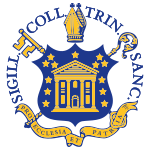Trinity College, Connecticut
 |
|
|
Former names
|
Washington College (1823–1845) |
|---|---|
| Motto | Pro Ecclesia Et Patria (Latin) |
|
Motto in English
|
For Church and Country |
| Type | Private liberal arts college |
| Established | May 1823 |
| Endowment | $524.3 million (2016) |
| President | Joanne Berger-Sweeney |
| Dean | Tim Cresswell |
|
Academic staff
|
267 |
| Students | 2,350 |
| Undergraduates | 2,259 (Fall 2016) |
| Postgraduates | 91 (Fall 2016) |
| Location | Hartford, Connecticut, U.S. |
| Campus | Urban |
| Colors | Blue and old gold |
| Athletics | NCAA Division III – NESCAC |
| Sports | 29 varsity teams |
| Nickname | Bantams |
| Mascot | Bantam |
| Affiliations | CIC, Annapolis Group, Oberlin Group, CLAC |
| Website | www |
 |
|
| University rankings | |
|---|---|
| National | |
| Forbes | 84 |
| Liberal arts colleges | |
| U.S. News & World Report | 38 |
| Washington Monthly | 85 |
Trinity College is a private liberal arts college in Hartford, Connecticut. Founded in 1823, it is the second-oldest college in the state of Connecticut after Yale University. The college is an urban campus.
Coeducational since 1969, the college enrolls 2,300 students. Trinity offers 38 majors and 26 minors, with a student to faculty ratio of 10:1. The college is a member of the New England Small College Athletic Conference (NESCAC) and is often referred to as one of the "Little Ivies". U.S. News & World Report ranked Trinity tied for 38th in its 2017 ranking of best national liberal arts colleges in the United States.
Early Connecticut was dominated by Congregationalists. Episcopalians, who'd long sought to set up their own college, were provided an opportunity when the Connecticut Constitution disestablished the Congregationalist Church 1818. It was taken by Bishop Thomas Brownell, who opened Washington College in 1824 to nine students and the vigorous protest of Yale alumni.
A fourteen-acre site was chosen, at the time about a half-mile from the city of Hartford. Over time Bushnell Park was laid out to the north and the east, creating a beautiful space.
The college was renamed Trinity College in 1845; the original campus consisted of two Greek Revival buildings, one housing a chapel, library, and lecture rooms and the other, a dormitory.
The site next to Bushnell Park, where Trinity College then stood, was deemed to be an ideal location to build a state house. So the trustees were persuaded to sell the entire campus to the city in 1872 for $600,000. The trustees moved the college to an 80 acre site on a ridge on the western edge of Hartford. Then-president Abner Jackson hired an English architect to draw up plans for an entire campus. Construction of the new campus was begun under the presidency of Thomas Ruggles Pynchon (1874–1883).
...
Wikipedia
